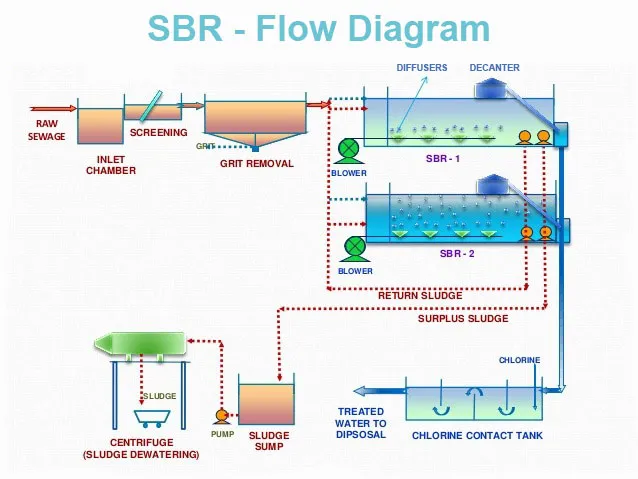Functions of SBR Technology in STP

Sewage treatment is a critical process to protect the environment and public health. Among the various sewage treatment methods, Sequential Batch Reactor (SBR) sewage treatment plants stand out as efficient, cost-effective, and environmentally friendly systems. In this blog, we will explore the SBR sewage treatment process, its advantages, and its role in creating a cleaner and more sustainable future.
Understanding the SBR Sewage Treatment
SBR sewage treatment plants are a type of wastewater treatment facility that follows a batch processing approach. Unlike continuous flow systems, SBR plants divide the treatment process into distinct sequential phases, each performed in the same tank. These phases typically include:
- Filling: Wastewater is introduced into the treatment tank, allowing solids to settle and separate from the liquid.
- Aeration: In this phase, the tank is aerated to promote the growth of beneficial microorganisms that break down organic matter in the wastewater.
- Settling: After aeration, the microorganisms settle to the bottom of the tank, forming a sludge layer, while the treated water becomes clearer.
- Decanting: The clear water at the top of the tank is carefully decanted and released as the treated effluent.
- Idle Phase: The tank remains empty to allow for settling and the formation of new biomass for the next cycle.
Advantages of SBR Sewage Treatment Plants
- Flexible Operation: SBR sewage treatment plants are highly flexible and adaptable to varying wastewater loads. They can efficiently handle fluctuations in flow and organic load.
- High-Quality Effluent: The sequential approach of SBR systems allows for better treatment and higher-quality effluent. These plants effectively remove organic matter, suspended solids, and nutrients, ensuring that the treated water is safe for release into the environment.
- Compact Footprint: SBR sewage treatment plants often have a smaller physical footprint compared to traditional wastewater treatment systems, making them suitable for areas with limited space.
- Lower Energy Consumption: SBR plants are energy-efficient because aeration and other processes can be optimized for different phases. This can lead to reduced operational costs and a smaller carbon footprint.
- Reduced Sludge Production: SBR systems produce less sludge compared to some other treatment methods, reducing the costs and environmental impact associated with sludge disposal.
- Easy Maintenance: These systems are relatively simple to maintain and operate, making them an attractive option for smaller municipalities and industrial facilities.
Sustainability and the Environment
SBR sewage treatment plants contribute to environmental sustainability in several ways:
- Water Protection: By effectively treating wastewater, these plants prevent pollution of water bodies, safeguarding aquatic ecosystems and preserving water quality.
- Resource Conservation: The reduction in sludge production and energy-efficient operation contribute to resource conservation and reduced environmental impact.
- Regulatory Compliance: SBR systems are designed to meet stringent environmental regulations, ensuring that treated effluent is within permissible limits.
Conclusion
SBR sewage treatment plants are a sustainable and efficient solution for wastewater treatment, offering benefits such as flexibility, high-quality effluent, and reduced operational costs. These systems play a crucial role in protecting the environment, public health, and natural resources, making them an essential component of a cleaner and more sustainable future. As technology continues to advance, SBR sewage treatment will likely become even more accessible and effective, contributing to a greener world for generations to come.
For any type of queries, please contact us!
